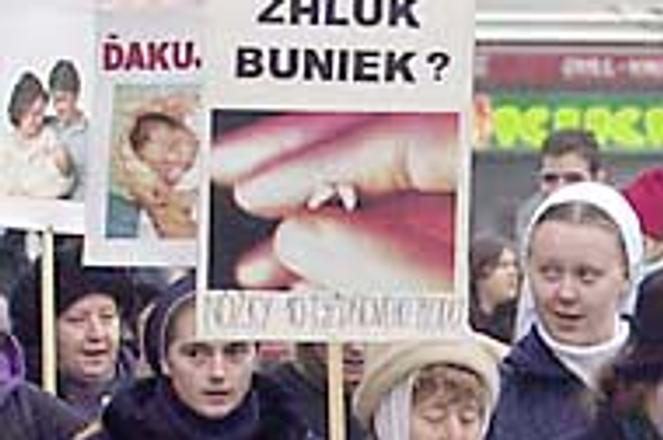ANTI-ABORTION campaigners take to the streets of Bratislava.photo: TASR
THE SLOVAK Constitutional Court is set to rule on whether abortions should be banned in Slovakia in response to claims by a group of mainly Christian Democratic (KDH) MPs that the country's current abortion law is unconstitutional.
Opponents of the proposed ban argue that the restriction would lead to an increase in back-street abortions and would result in more Slovak women travelling abroad to get the service.
Pro-choice groups insist that education rather than legal restriction is the way to go, adding that the number of abortions has been falling steadily over the last decade due to the wide availability and increased use of modern contraception. Since the fall of communism in 1989, the number of abortions has fallen from nearly 50,000 instances in 1988 to 16,000 in 2001.
But backers of the ban say that the Slovak constitution protects life even before birth, and they slam abortions as immoral.
"For us every termination of life, including the life of a foetus, is murder. Unfortunately there are many people who tolerate abortions despite claiming they are Catholic," said KDH MP Mária Sabolová.
In the most recent national census, carried out in 2001, nearly 84 per cent of Slovaks declared themselves religious, with 70 per cent saying they were Catholic. Nevertheless, according to a 2002 survey carried out by the Public Opinion Research Institute, only 13 per cent of women are strictly opposed to abortions, while 65 per cent think that each woman should have the right to decide about her pregnancy.
Article 15 of the Slovak constitution says that everyone has a right to live and that human life is worth protecting even before birth. The abortion law, on the other hand, allows for abortions to be carried out up to the 12th week of pregnancy. The Constitutional Court is expected to take several months to examine all aspects of existing Slovak legislation before delivering a final verdict.
Oľga Pietruchová of the group Možnosť voľby (Pro Choice) warned that if abortions are banned, Slovakia will experience an unprecedented rise in back-street abortions. She said that is what happened in strongly Catholic Poland, which outlawed abortions in 1993. Abortions are legal in the vast majority of European states.
"[In Poland] abortions are carried out despite the ban. Some women travel abroad, while others have them carried out illegally for high fees ranging from $750 to $3,000. The same would happen here," Pietruchová said.
Backers of the ban argue that more babies will be born if a strict approach to abortions is adopted. Pietruchová, however, pointed out that in Poland "no demographic rise has occurred since the ban".
"I am not in favour of abortions but I am in favour of choice. Abortions were, are, and will be carried out. The point is, how does society deal with this fact?" Pietruchová added.
Tatiana Icová, a gynaecologist from Piešťany also thought that banning abortions was not the right solution.
"Women have to have the opportunity to choose," she said.
According to Icová, a decline in abortions would be best achieved through education rather than restriction.
"We need to educate our youth. That is the best way to eliminate complications or difficult choices that might arise from having unprotected sex," she said.
But Martin Dilong from Community of Life, a group advocating the rights of unborn children, said that just as a woman has a right "to decide when and in what situation she wants to have babies", society must protect the right to life of the foetus through all available means.
"When women talk about their right to decide for themselves, I only hear one side of the argument - the side of the woman. From the time a child is conceived a woman's right should be limited to what is in the interest of the unborn child," Dilong said.


